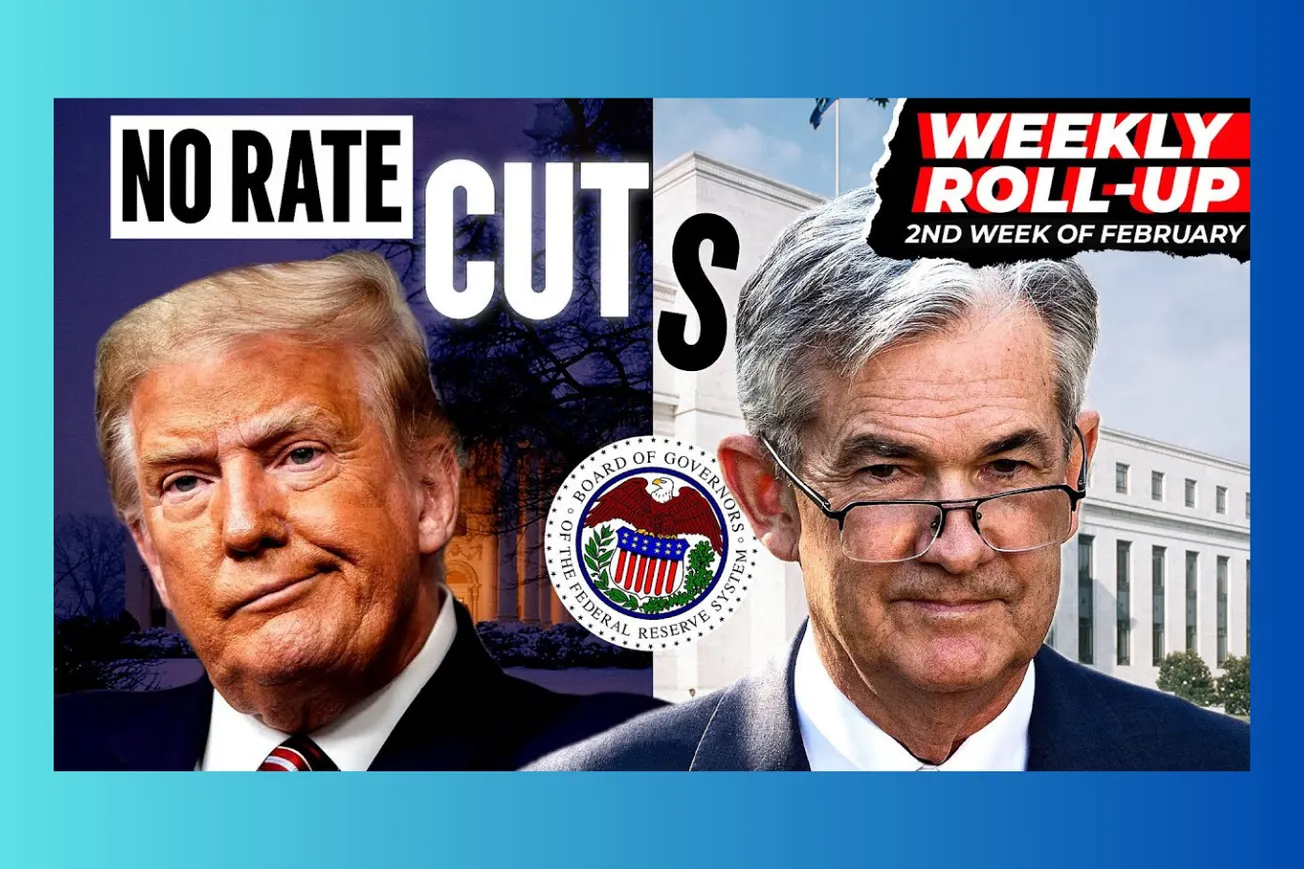Table of Contents
The second week of February delivered unprecedented political-economic tension as Trump challenged Federal Reserve policy while crypto infrastructure projects achieved major decentralization milestones.
Key Takeaways
- Trump publicly opposed Fed's hawkish stance on interest rates, creating uncertainty for pro-inflation policies
- Robin Hood's crypto revenue exploded 700% to $358 million, signaling retail trading renaissance
- Arbitrum achieved stage-two rollup status with permissionless fault proofs, leading decentralization race
- Celebrity meme coin controversies exposed deeper issues with speculative trading culture
- Ethereum staking ETF proposals could unlock institutional yield-bearing products
- OpenSea announced major pivot with native token launch to recapture market share
- Infrastructure token launches struggled against meme coin dominance and high private valuations
- Brian Quintenz nomination for CFTC chair represents strongest crypto regulatory appointment yet
- DeFi protocols like Morpho gained traction through competitive curator models
Timeline Overview
- Opening Discussion — Macro analysis of Trump's conflict with Powell over interest rate policy, inflation data disappointment
- Market Performance — Bitcoin flat at -1.8%, Ethereum continuing slide against Bitcoin at $2,600, altcoin bloodbath in 50-100 market cap range
- ETF Developments — 21Shares staking ETF proposal, Trump Truth Social ETF filings including Bitcoin products
- Earnings Season — Robin Hood smashes expectations with 5x volume increase, crypto revenue surge, ambitious roadmap announcements
- Regulatory News — Brian Quintenz CFTC nomination analysis, on-chain activity verification, comparison to Hester Peirce
- Airdrop Analysis — Recent token launches performing poorly, Hyperliquid exception, MegaETH NFT distribution strategy
- Infrastructure Updates — Arbitrum fault proof deployment, L2Beat security classifications, stage progression analysis
- Community Drama — Vitalik communism tweet controversy, Ethereum Foundation hiring debates, sentiment analysis
- Celebrity Tokens — Dave Portnoy meme coin manipulation saga, JAILSTOOL token pump, financial performance art discussion
Federal Reserve Standoff Creates Crypto Market Uncertainty
The Federal Reserve's decision to pause rate cuts after disappointing inflation data created immediate tension with Trump administration economic priorities. Powell's congressional testimony emphasized the Fed's commitment to fighting elevated inflation, with month-over-month increases hitting 0.5% versus forecasted 0.2%. This hawkish stance directly conflicts with Trump's tariff-heavy agenda that inherently drives inflationary pressures.
- Trump's Truth Social post demanding lower rates alongside upcoming tariffs reveals the fundamental contradiction in his economic strategy, where protectionist policies require accommodative monetary conditions to remain politically viable
- The crypto market's weekend-only trading advantage positions digital assets as "a prediction market on the weekends for what the NASDAQ is going to do on Monday," according to market analysis
- Bitcoin's relatively muted 1.8% weekly decline suggests the cryptocurrency market may be developing more resilience to traditional macro volatility compared to previous cycles
- Ethereum's continued underperformance against Bitcoin, trading at $2,600, reflects ongoing concerns about layer-two fragmentation and reduced network effect value accrual
- The post-election exuberance that drove commodity prices higher for two months appears to be moderating, potentially creating space for more rational asset pricing
- Infrastructure projects face particular pressure as the market becomes increasingly impatient with high private valuations, preferring fair-launch mechanisms demonstrated by successful projects like Hyperliquid
Exchange-Traded Fund Innovation Accelerates Institutional Adoption
The ETF landscape experienced significant developments that could reshape how institutions access cryptocurrency exposure. 21Shares filed the first known proposal to add staking functionality to existing Ethereum ETFs, while Trump's Truth Social Financial Group entered the crowded ETF market with America-first themed products.
- Staking ETF integration could eliminate fees entirely by passing through native yield to investors, mimicking the Vanguard low-fee index fund model that has dominated traditional markets for decades
- Trump's ETF filings including Bitcoin, "Made in America," and energy independence products face skeptical market reception due to late market entry and uncertain brand premium justification
- The BlackRock Bitcoin ETF's superior performance despite higher fees demonstrates that brand equity can command premium pricing in the crypto ETF space, setting precedent for celebrity-backed financial products
- Robin Hood's dramatic crypto revenue growth from $14 billion to $71 billion in quarterly volume represents a 5x increase that significantly outpaced traditional crypto exchanges like Coinbase
- Yield-bearing stablecoin integration into trading platforms could revolutionize sports betting and prediction markets by compensating for spread disadvantages through passive income generation
- The institutional versus retail trading volume dynamics suggest that post-election Bitcoin buying required coordination beyond individual retail investors, indicating sophisticated capital deployment strategies
Regulatory Landscape Shifts Toward Crypto-Native Leadership
Brian Quintenz's nomination for CFTC Chairman represents the most crypto-aligned regulatory appointment in U.S. history. His on-chain activity verification and deep protocol understanding signal a fundamental shift from skeptical oversight to innovation-friendly governance.
- Quintenz's Farcaster posting and on-chain NFT minting activity demonstrates practical cryptocurrency experience that addresses common criticisms about regulators lacking real-world blockchain interaction knowledge
- The nominee's previous Obama administration appointment and bipartisan support virtually guarantee Senate confirmation, providing regulatory certainty for derivative and commodity classification issues
- His public statement emphasizing America's blockchain technology leadership creates regulatory framework for competitive advantage against international crypto hubs like Singapore and Dubai
- The CFTC's expanded role in cryptocurrency oversight positions the agency as more innovation-friendly compared to the SEC's enforcement-heavy approach under previous leadership
- Robin Hood's ambitious tokenization roadmap, including private company shares and stock market digitization, requires supportive regulatory environment that Quintenz appointment could facilitate
- Prediction market integration across traditional financial platforms faces complex jurisdictional questions that crypto-native CFTC leadership could resolve through clear guidance frameworks
Infrastructure Projects Navigate Valuation Reset and Technical Milestones
The cryptocurrency infrastructure sector experienced a stark divide between technical achievements and market performance. Arbitrum's stage-two rollup milestone contrasted sharply with broader infrastructure token struggles against inflated private valuations.
- Arbitrum's permissionless fault proof deployment earned four out of five green security classifications from L2Beat, positioning it one governance vote away from full decentralization status
- The ability to safely migrate significant total value locked during fault proof transitions demonstrates technical maturity that differentiates leading layer-two solutions from experimental alternatives
- Recent infrastructure airdrops including Pengu (down 70%), Anime (down 80%), and Story Protocol (down 30%) reflect market rejection of high private round valuations
- Meme coin popularity has shortened investor patience for value discovery timelines, creating pressure for immediate utility demonstration rather than long-term infrastructure building
- Hyperliquid's exceptional performance from $4 to $25 launch price maintenance stems from pre-token revenue generation exceeding hundreds of millions in annualized fees
- The market increasingly demands fair launch mechanisms over venture-backed token distributions, potentially reshaping how blockchain projects approach fundraising and community building
Alternative Distribution Mechanisms Emerge in Token Launch Evolution
MegaETH's NFT-based token distribution and OpenSea's late-stage airdrop announcement represent evolving approaches to community building and value distribution. These mechanisms attempt to balance fair access with sustainable project funding.
- MegaETH's $560 million valuation through NFT proxy distribution offers more accessible pricing compared to billion-dollar infrastructure project benchmarks, with interactive AI-powered characters creating viral community engagement
- The soulbound NFT structure prevents secondary market speculation while maintaining explicit future token conversion rights, addressing criticism about hidden ICO mechanics
- OpenSea's "O" token announcement comes after the NFT bull market peak, relying on millennial nostalgia rather than new user acquisition as the primary growth strategy
- The platform's pivot toward "less web2, more web3" philosophy acknowledges strategic mistakes during peak NFT mania when corporate risk aversion limited product innovation
- Solana's generational appeal as the "Gen Z chain" where young users identify blockchain technology with Phantom wallet rather than underlying network infrastructure poses competitive challenges for Ethereum-based platforms
- Interactive token distribution mechanisms that provide entertainment value beyond speculative trading could emerge as sustainable alternatives to pure airdrop farming behaviors
Community Governance and Cultural Tensions Expose Ideological Divides
Vitalik Buterin's communism joke and the surrounding community reaction revealed deeper philosophical tensions within Ethereum's ecosystem between public goods funding advocates and aggressive market participants.
Laura Shin observed that "the fact that the ethereum community is talking more about vitalik bad joke about communism today rather than about an eth ETF potentially offering staking yield or the EF finally deploying Capital into defi is a sign of how bad sentiment is in ethereum right now."
- The controversy originated from Ethereum Foundation hiring decisions rather than economic policy, highlighting governance sensitivity around institutional direction and cultural alignment
- Amin Solomani's criticism of GitCoin hiring reflects broader tension between public goods funding approaches and market-driven development incentives
- Vitalik's credible neutrality principles face pressure from community factions demanding more aggressive competitive positioning against alternative blockchain platforms
- The Ethereum Foundation's deployment of 50,000 ETH into Spark and Compound protocols demonstrates institutional DeFi engagement that received less attention than social media controversies
- Community discourse increasingly prioritizes entertainment and conflict over substantive technical or economic developments, potentially undermining serious project evaluation and investor education
- The ideological split between older DeFi-focused developers and newer public goods advocates mirrors broader societal political divisions that could impact protocol governance decisions
Celebrity meme coin manipulation reached new extremes with Dave Portnoy's deliberate pump-and-dump schemes that exposed the problematic dynamics of influence-based trading. His transparent approach to market manipulation created what analysts described as "financial performance art" resembling financial domination rather than investment strategy.
The Barstool Sports founder's explicit warnings that "I am going to dump on you" followed by successful execution represents a disturbing evolution where followers willingly participate in schemes guaranteed to lose them money. This behavior suggests crypto trading has become a form of parasocial relationship exploitation rather than traditional investment activity.
Trump's Fed challenge signals broader political-economic realignment where traditional monetary policy independence faces populist pressure. Combined with crypto-native regulatory appointments and infrastructure decentralization milestones, these developments position digital assets for mainstream institutional adoption despite continued speculative excesses in meme coin markets.





